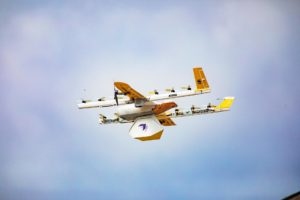
Safety is the agency’s top priority – but the message sent by the new guidance is clear. The FAA is working to help drone service providers go to work on behalf of communities, expanding the use of medical drone delivery and other community initiatives.
Google spin-off Wing is expanding existing drone delivery programs in light of the coronavirus. About a year ago, Wing was the first drone operator in the U.S. to be certified as an air carrier, granting the company authority to conduct commercial drone delivery. Since then, the company has begun testing operations in Virginia. Now, their drone delivery program is helping consumers to limit trips to the store and receive contactless delivery of supplies. From Wing:
In the US, W ing is operating a residential package delivery service in Christiansburg, Virginia — the first and only drone delivery service available to the general public in the United States at this time. In partnership with Walgreens we’re delivering health and wellness products like over-the-counter medicines, toilet paper, toothpaste and other home essentials. We’re also working with B rugh Coffee, Sugar Magnolia and Mockingbird Cafe – delivering their range of locally made food and coffee to the community. Wing is also working with FedEx Express to deliver qualifying parcels directly to the homes of customers.
The current crisis makes the case for drone delivery abundantly clear, as other usual modes of transport become more limited in supply. Waiting lists for grocery delivery by van are several weeks long in some communities: even Amazon is feeling the strain of increased demand amidst fears of operator safety.
The FAA’s Updated Guidance:
Drone Use for Response Efforts
The FAA is enabling drone use for COVID-19 response efforts within our existing regulations and emergency procedures. Our small unmanned aircraft rule (Part 107) and Certificate of Authorization process allow operators to transport goods and certain medical supplies – including test kits, most prescription drugs and, under certain circumstances, blood – provided the flight complies with all provisions of the rule or authorization. The FAA also issues special approvals, some in less than an hour, for flights that support emergency activities and appropriate government, health, or community initiatives. The agency’s Systems Operations Support Center is available 24/7 to process emergency requests. Safety is the top consideration as we review each request.
Miriam McNabb is the Editor-in-Chief of DRONELIFE and CEO of JobForDrones, a professional drone services marketplace, and a fascinated observer of the emerging drone industry and the regulatory environment for drones. Miriam has penned over 3,000 articles focused on the commercial drone space and is an international speaker and recognized figure in the industry. Miriam has a degree from the University of Chicago and over 20 years of experience in high tech sales and marketing for new technologies.
For drone industry consulting or writing, Email Miriam.
TWITTER:@spaldingbarker
Subscribe to DroneLife here.